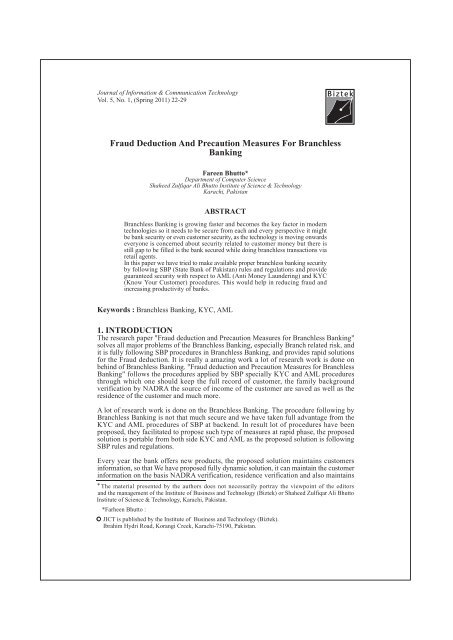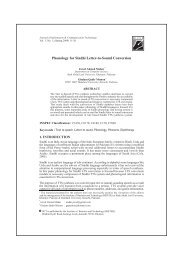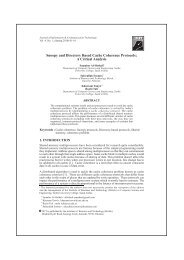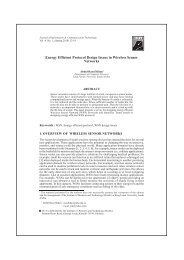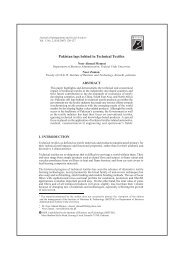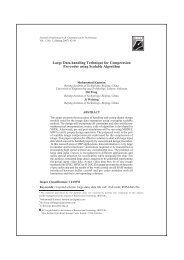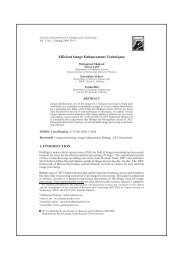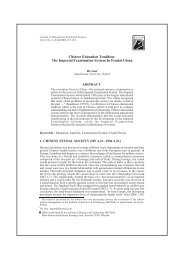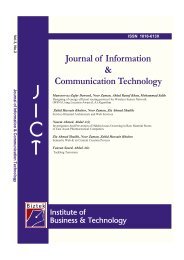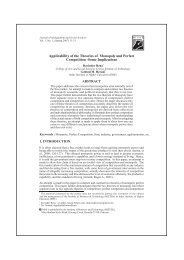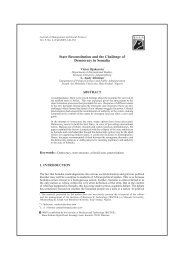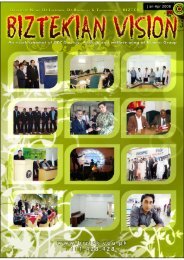Fraud Deduction And Precaution Measures For Branchless Banking
Fraud Deduction And Precaution Measures For Branchless Banking
Fraud Deduction And Precaution Measures For Branchless Banking
Create successful ePaper yourself
Turn your PDF publications into a flip-book with our unique Google optimized e-Paper software.
Journal of Information & Communication Technology<br />
Vol. 5, No. 1, (Spring 2011) 22-29<br />
<strong>Fraud</strong> <strong>Deduction</strong> <strong>And</strong> <strong>Precaution</strong> <strong>Measures</strong> <strong>For</strong> <strong>Branchless</strong><br />
<strong>Banking</strong><br />
Fareen Bhutto*<br />
Department of Computer Science<br />
Shaheed Zulfiqar Ali Bhutto Institute of Science & Technology<br />
Karachi, Pakistan<br />
ABSTRACT<br />
<strong>Branchless</strong> <strong>Banking</strong> is growing faster and becomes the key factor in modern<br />
technologies so it needs to be secure from each and every perspective it might<br />
be bank security or even customer security, as the technology is moving onwards<br />
everyone is concerned about security related to customer money but there is<br />
still gap to be filled is the bank secured while doing branchless transactions via<br />
retail agents.<br />
In this paper we have tried to make available proper branchless banking security<br />
by following SBP (State Bank of Pakistan) rules and regulations and provide<br />
guaranteed security with respect to AML (Anti Money Laundering) and KYC<br />
(Know Your Customer) procedures. This would help in reducing fraud and<br />
increasing productivity of banks.<br />
Keywords : <strong>Branchless</strong> <strong>Banking</strong>, KYC, AML<br />
1. INTRODUCTION<br />
The research paper "<strong>Fraud</strong> deduction and <strong>Precaution</strong> <strong>Measures</strong> for <strong>Branchless</strong> <strong>Banking</strong>"<br />
solves all major problems of the <strong>Branchless</strong> <strong>Banking</strong>, especially Branch related risk, and<br />
it is fully following SBP procedures in <strong>Branchless</strong> <strong>Banking</strong>, and provides rapid solutions<br />
for the <strong>Fraud</strong> deduction. It is really a amazing work a lot of research work is done on<br />
behind of <strong>Branchless</strong> <strong>Banking</strong>. "<strong>Fraud</strong> deduction and <strong>Precaution</strong> <strong>Measures</strong> for <strong>Branchless</strong><br />
<strong>Banking</strong>" follows the procedures applied by SBP specially KYC and AML procedures<br />
through which one should keep the full record of customer, the family background<br />
verification by NADRA the source of income of the customer are saved as well as the<br />
residence of the customer and much more.<br />
A lot of research work is done on the <strong>Branchless</strong> <strong>Banking</strong>. The procedure following by<br />
<strong>Branchless</strong> <strong>Banking</strong> is not that much secure and we have taken full advantage from the<br />
KYC and AML procedures of SBP at backend. In result lot of procedures have been<br />
proposed, they facilitated to propose such type of measures at rapid phase, the proposed<br />
solution is portable from both side KYC and AML as the proposed solution is following<br />
SBP rules and regulations.<br />
Every year the bank offers new products, the proposed solution maintains customers<br />
information, so that We have proposed fully dynamic solution, it can maintain the customer<br />
information on the basis NADRA verification, residence verification and also maintains<br />
* The material presented by the authors does not necessarily portray the viewpoint of the editors<br />
and the management of the Institute of Business and Technology (Biztek) or Shaheed Zulfiqar Ali Bhutto<br />
Institute of Science & Technology, Karachi, Pakistan.<br />
*Farheen Bhutto :<br />
C JICT is published by the Institute of Business and Technology (Biztek).<br />
Ibrahim Hydri Road, Korangi Creek, Karachi-75190, Pakistan.
<strong>Fraud</strong> <strong>Deduction</strong> <strong>And</strong> <strong>Precaution</strong> <strong>Measures</strong> <strong>For</strong> <strong>Branchless</strong> <strong>Banking</strong><br />
the AML of the customer, <strong>Fraud</strong> deduction and <strong>Precaution</strong> <strong>Measures</strong> for <strong>Branchless</strong> <strong>Banking</strong><br />
is totally following State Bank of Pakistan rules and regulations as followed by general<br />
banking sector.<br />
As we already discussed it is fully following State Bank of Pakistan rules and regulations<br />
as followed by general banking sector, that's why it is completely dynamic system, we<br />
know that customer verification can be one by NADRA and also by residence verification<br />
along with source of income of the customer and it is possible, bank have rights to do<br />
AML and KYC accordingly<br />
2. PURPOSE OF STUDY<br />
We would like to extract the fraud caused by branchless banking since I am concerned of<br />
precaution measures for the fraud caused as to avoid the Risk and maintain the reliability<br />
in branchless banking.<br />
Thus the Aim is to study, how frauds are being caused in branchless banking whether it<br />
would be customer based or branch based, and try to propose precaution measures for the<br />
fraud caused and make it a cheaper and secure alternative for branch based bank.<br />
As a result this research proposes precaution measure for branchless banking as to avoid<br />
risk and make it secure as the lack of KYC and AML their might be or even there are<br />
several fraud caused in branchless banking. The extraction of frauds is done by survey of<br />
banks and the retail agents as to know what are the frauds caused and the lacks caused<br />
by branchless banking as to prevent them before happening or providing proposed solutions.<br />
This examine also make lawful that the extraction in a well defined and risk secure is more<br />
favorable in reducing fraud.<br />
3. RESEARCH METHODOLOGY<br />
The possibility of this research is to study the fraud caused and come across with precaution<br />
measures as to reduce risk.<br />
Methodology employed for the research is to analyze the need of KYC and AML in<br />
branchless banking and what might be the fraud caused due to lack of KYC and AML or<br />
the reasons behind the fraud caused after analyzing frauds aim to introduce new process<br />
for Risk Management of <strong>Branchless</strong> <strong>Banking</strong> concerning KYC (know your customer) and<br />
AML (Anti money laundering) as to minimize the risk and by following rules and regulations<br />
imposed by SBP to branch based banking.<br />
The research method consist of two typical phases that intend to recognize the fraud caused<br />
by branchless banking due to lack of KYC and AML procedures and to propose some<br />
precaution measures as to reduce the fraud caused. The research use to monitor the<br />
conversion of black money to white money and to avoid the risk caused and as long as<br />
precaution measures for the illegal activities.<br />
The report is categorized according to the field of interest followed by Survey Research<br />
or Descriptive Research. So the methodology will use for my research is; first to analyze<br />
the need of KYC and AML in <strong>Branchless</strong> <strong>Banking</strong>. If it is helpful then try to introduce<br />
new process for Risk Management of <strong>Branchless</strong> <strong>Banking</strong> concerning KYC (know your<br />
customer) and AML (Anti money laundering).imposed by SBP to general banking to<br />
reduce risk with in premises<br />
4. RISK MANAGEMENT<br />
Banks can come up to Risk Management, It might be from banks point of view or the<br />
retail agent point of view. <strong>For</strong> both of them it might be or might not be the same point of<br />
Vol. 5, No. 1, (Spring 2011) 23
Fareen Bhutto<br />
view, though might advantage one another perspective.<br />
There are many risk towards banking might be KYC or AML related or any other illegal<br />
activities related risk. These risks are mostly consistent to one another.<br />
The risks can be:<br />
. Anti money laundering/illegal activities issues<br />
. Bank status issues<br />
. KYC issues<br />
The primary step is risk measurement which s one of the key element towards risk<br />
management. It is necessary to measure the key sort of criminal/illegal activities which<br />
could be the subject of compliance at bank. It should be dissimilar for dissimilar limited<br />
situations; Banks should keep an eye over adjacent countries or associate banks for similar<br />
products, services, customers and locations.<br />
After that examine valid evidence towards particular risk type as to come up with a quantity<br />
of wrap up, There might be number of aspects towards analysis as customers account<br />
information, customers background, customers nature of business, customers source of<br />
income and also the types of transactions, Banks who understand these sort of risk are in<br />
better position to establish control and remain secure from illegal activities<br />
The agent's needs to examine all sort of related factors and have knowledge to minimize<br />
the risk and keep the record of customer as to minimize the illegal activities and keep the<br />
status of the bank to its level or the agents should be the bank employee who should know<br />
about the compliance, the agents should apply special responsiveness of the risk associated<br />
factors and endeavor to minimize as much risk as he can. The agents should be capable<br />
of risk analysis and even assist banking sectors for minimizing illegal activities.<br />
i) ANTI-MONEY LAUNDERING/ILLEGAL ACTIVITIES ISSUES<br />
A bank enlarged Anti money laundering and illegal risk activities when it infringe or<br />
disregard rule and regulations implied by SBP to minimize risk, The risk might increase<br />
if the governing bank products, services clients are not verified or novel according to rules<br />
and regulations. When bank are serious about compliance and paying full attention to rules<br />
and regulations regarding anti money laundering end result in bank superior<br />
The compliance/anti money laundering risk might be caught while reviewing customer<br />
record as the customer account, source of income and by focusing the immediate changes<br />
in transaction as the customer of low profile tries to do transaction in millions or billions<br />
then the bank should keep notice that what is the source of income as to reduce risk and<br />
result in bank fine.<br />
Less control over fraud or illegal activities may increase risk towards banking sector,<br />
possibility to increase in risk towards any service or product towards money laundering.<br />
The bank should follow the risk management and keep complete control towards daily<br />
transactions as to get precaution measures by following rules and regulations by the implied<br />
banks.<br />
ii) BANK STATUS ISSUES<br />
As it's well said "Don't comprise yourself, you're all you've got" and also "Status is a<br />
victory, not a gift". Therefore every sector/industry needs to maintain its status and quality<br />
mean while the bank's ability to maintain competitive position within banking system; it<br />
might be from products and services perspective or its control over frauds. Increase in anti<br />
money laundering or lack of control towards fraud can cause risk towards status of bank.<br />
To maintain status of the bank it must work out precaution measures when come across<br />
any amendment in transactions. The increase in status risk arise once a bank is no longer<br />
to assemble its responsibility<br />
24 Journal of Information & Communication Technology
<strong>Fraud</strong> <strong>Deduction</strong> <strong>And</strong> <strong>Precaution</strong> <strong>Measures</strong> <strong>For</strong> <strong>Branchless</strong> <strong>Banking</strong><br />
iii) KNOW YOUR CUSTOMER ISSUES<br />
The most important aspect for any industry is to know your customer and to reduce the<br />
risk towards knows your customer, while knowing who your customer is? What is the<br />
backdrop of your customer via NADRA verification? KYC requirements might include:<br />
1. Fill out an account opening application form.<br />
2. Photocopy of NADRA verified CNIC card.<br />
3. Face to face contact with account holder, fingerprint scan and his/her digital<br />
photograph taken by agent.<br />
Know your customer risk might be affected by anti money laundering or any other financial<br />
illegal activity which impact on bank status, compliance and also in KYC. It will result<br />
in superior to fill out the green area of KYC (Know your Customer) issues.<br />
5. PRECAUTIONARY MEASURES<br />
The section provides a general idea of Bank-AOF-Retail Agent that give secure move<br />
toward fraud deduction and precaution measures for <strong>Branchless</strong> <strong>Banking</strong>., against illegal<br />
activities caused due to lack of KYC and AML policy<br />
A) Current Procedure of <strong>Branchless</strong> <strong>Banking</strong><br />
The current procedure of <strong>Branchless</strong> <strong>Banking</strong> is not properly followed by KYC and AML<br />
policy implied by SBP to general banking which causes illegal activities through <strong>Branchless</strong><br />
<strong>Banking</strong> that might affect correspondent bank in various ways.<br />
B) The Retailer Registration<br />
The retailer registers as an agent with the correspondent bank. The bank provides them<br />
identity information consist of his (retailer) name and unique number. The number provided<br />
is secret between retailers and the bank. The retailers keep the unique number to themselves<br />
until they are used.<br />
C) The Customers Registration<br />
The customer visits the <strong>Branchless</strong> <strong>Banking</strong> outlet to transfer money.<br />
The retailer receives the NIC copy of the customer (not verified by NADRA system) along<br />
with mobile number.<br />
Customer gives the money to be transferred to the retail agent.<br />
Customer is given unique id number which can be shared to the person to whom money<br />
is going to be transferred.<br />
The customer gets payment confirmation via sms.<br />
D) The Receivers Registration<br />
The receiver visits the <strong>Branchless</strong> <strong>Banking</strong> outlet.<br />
Just give the unique ID and mobile number to retailer.<br />
Retailer gives the transferred amount to the receiver.<br />
The procedure is followed as:<br />
Vol. 5, No. 1, (Spring 2011) 25
Fareen Bhutto<br />
Figure 4<br />
Money transfer by current process [21]<br />
a) Planned Procedure of <strong>Branchless</strong> <strong>Banking</strong><br />
The planned procedure of <strong>Branchless</strong> <strong>Banking</strong> is completely following KYC and AML<br />
policy implied by SBP to general banking. The planned procedure helps in reducing fraud<br />
and proposing precaution measures for the fraud being caused.<br />
b) The Retailer Registration<br />
The retailer registers as an agent with the correspondent bank. The bank provides them<br />
identity information consist of his (retailer) name and unique number. The number provided<br />
is secret between retailers and the bank. The retailers keep the unique number to themselves<br />
until they are used. The bank provides them (retailers) Account Opening <strong>For</strong>m followed<br />
by KYC/AML policy. Retailers keep the records of the customers and pass the AOF to<br />
the correspondent bank. The retailers also keep the record of the customer's transactions.<br />
c) The Customer Registration<br />
The customer visits the <strong>Branchless</strong> <strong>Banking</strong> outlet to transfer money.<br />
The Account Opening <strong>For</strong>m filled by the customer is followed:<br />
Customer's basic information<br />
Copy of CNIC<br />
NADRA verification of CNIC<br />
Photocopy of Utility bill paid (not later than three months)<br />
Source of income<br />
Nature of business<br />
Monthly expected transactions<br />
Any of the blood relation contact number. /Next of Kin<br />
Customer gives the money to be transferred to the retail agent.<br />
Customer is given unique id number which can be shared to the person to whom money<br />
is going to be transferred.<br />
The customer gets payment confirmation via sms.<br />
d) The Receivers Registration<br />
The receiver visits the <strong>Branchless</strong> <strong>Banking</strong> outlet.<br />
The Account Opening <strong>For</strong>m filled by the receiver is followed:<br />
26 Journal of Information & Communication Technology
<strong>Fraud</strong> <strong>Deduction</strong> <strong>And</strong> <strong>Precaution</strong> <strong>Measures</strong> <strong>For</strong> <strong>Branchless</strong> <strong>Banking</strong><br />
Customer's basic information<br />
Copy of CNIC<br />
NADRA verification of CNIC<br />
Photocopy of Utility bill paid (not later than three months)<br />
Source of income<br />
Nature of business<br />
Monthly expected transactions<br />
Any of the blood relation contact number. /Next of Kin<br />
Just give the unique ID and mobile number to retailer.<br />
Retailer gives the transferred amount to the receiver.<br />
Receiver gets the confirmation via sms.<br />
The procedure is followed as:<br />
Figure 5<br />
Money transfer by proposed procedure [self]<br />
6. MRS. MARIA'S CASE STUDY<br />
The following Case study shows that what problems might be caused due to lack of KYC<br />
and AML policy [22]<br />
Mr. Nadeem Hussain: May I speak to Mrs. Maria?<br />
Mrs. Maria: Yes Maria here.<br />
Mr. Nadeem Hussain: Congratulation! Mrs. Maria I have great news for you.<br />
Mrs. Maria: Oh! May I know what that?<br />
Mr. Nadeem Hussain: Mrs. Maria being the customer of branchless banking you has been<br />
selected for the luxury cottage and car.<br />
Mrs. Maria: Oh really! That's the great news.<br />
Mr. Nadeem Hussain: Mrs. Maria you just have to deposit 1,000,000 to our company<br />
number (0345-0000000) from any of the easy paisa shop after that you will get your award<br />
at your door step without any further procedure.<br />
Mrs. Maria: OK, That's quite easy.<br />
Mr. Nadeem Hussain: Ok, Mrs. Maria we will start up our procedure as we receive your<br />
deposit<br />
Mrs. Maria: Sure! I am doing it right now..It's really a miracle.<br />
Mr. Nadeem Hussain: Thanks Bye for now<br />
Mrs. Maria: Ok Bye.<br />
Mrs. Maria: a wonderful opportunity for me I don't want to miss it.<br />
<strong>Branchless</strong> <strong>Banking</strong> Agent: Hi how can I help you?<br />
Vol. 5, No. 1, (Spring 2011) 27
Fareen Bhutto<br />
Mrs. Maria: I have to deposit an amount of 1,000,000 to this number (0345-0000000)<br />
<strong>Branchless</strong> <strong>Banking</strong> Agent: Sure you will receive the message at your number very soon.<br />
Mrs. Maria: Thanks<br />
<strong>Branchless</strong> <strong>Banking</strong> Agent: Thank you for using BB services.<br />
After a couple of days Mr. Maria get worried that she haven't receive any response from<br />
the company and then she call back the number of Mr. Nadeem Hussain and it was out<br />
of coverage then she went to the correspondent bank and showed the Deposit delivery<br />
message to the branch manager due to lack of KYC and AML at branchless banking the<br />
Manager apologies that they haven't any record of the mobile numbered customers.<br />
8. RESULTS<br />
The above case study shows that Mrs. Maria faced lots of problems due to lack of KYC<br />
and AML, Mrs. Maria lost money and bank faces lots of problems as reputation issues,<br />
operational issues and it also lose trust of the customers. If the KYC and AML policy were<br />
properly followed by <strong>Branchless</strong> <strong>Banking</strong> then it might cause reductions in illegal activities.<br />
9. CONCLUSION & FUTURE RECOMMENDATION<br />
<strong>Fraud</strong> deduction is severely reliant on profess flow followed by KYC and AML policy to<br />
make precaution measures for the fraud caused. A victorious policy can be used to minimize<br />
illegal activities caused. The attack on BB may be point out by following the policy of<br />
SBP which is commonly followed by general banking. Reputational, operational,<br />
authorization and economic risk might be caused due to lack of KYC and AML policy.<br />
<strong>Precaution</strong> measures are necessary for customers as well as agents to overcome fraud.<br />
Though, precautions measures restrict the criminals to utilize an exclusive and risky policy<br />
used that requires their policy of know your customer. Auxiliary, the criminals verified<br />
that it was possible to defeat Mrs. Maria's case by faking or acquiring numbers via lack<br />
of KYC and AML record of the customers and publications.<br />
Therefore, <strong>Precaution</strong> measures against fraud caused requires follow-up of SBP policy for<br />
KYC and AML to minimize the major threat to user and agent, as refund process for endusers<br />
does not exist.<br />
8. ACKNOWLEDGMENT<br />
I am gratified from the core of my heart to ALMIGHTY ALLAH who made it possible<br />
to complete this independent study-I successfully.<br />
It is well known that knowledge is power, but no one can acquire knowledge himself<br />
alone, I at least seek some help from literature review or of the people who know the<br />
subject.<br />
Therefore, the research work cannot become mine unless I clear my depths and repay in<br />
terms of gratitude to those, who made it possible. It is highest glory and distinction for<br />
me to thanks those who have advised, helped and worked with me in the preparation of<br />
research work particularly.<br />
I am greatly thankful to my worthy project supervisor Prof.Naeem-ul-Hassan Janjua,<br />
for his dedication, guidance and the efforts taken by him which empowered me to complete<br />
this work, while extending undaunted support and on holding our hands towards the<br />
success that makes a difference.<br />
REFERENCES<br />
[1] Panjwani saurabh "Towards End-to-End Security in <strong>Branchless</strong> banking."(2011)<br />
[2] Saurabh Panjwani, "Usably Secure, Low-Cost Authentication for Mobile <strong>Banking</strong>",<br />
Edward Cutrell, Microsoft Research India 2010,<br />
28 Journal of Information & Communication Technology
<strong>Fraud</strong> <strong>Deduction</strong> <strong>And</strong> <strong>Precaution</strong> <strong>Measures</strong> <strong>For</strong> <strong>Branchless</strong> <strong>Banking</strong><br />
[3] The role of information and communication technologies(ICT)in improving microcredit:<br />
The case of correspondent <strong>Banking</strong> in Brazil<br />
[4] Nadra technologies limited(ntl) "Setting up of branchless payment ecosystem<br />
&implementation of value added services for national smart services platform"(2010)<br />
[5] Ashlesh Sharma, Lakshmi narayan "Secure <strong>Branchless</strong> <strong>Banking</strong>" department of<br />
computer science courant institute of mathematical sciences New York University.(2010)<br />
[6] Muhammad Adeel Mannan and Syed Najmul Haq, "Perilous Issues in <strong>Branchless</strong><br />
<strong>Banking</strong> " Szabist May 2009.<br />
[7] Monique Cohen, Danielle Hopkins and Julie Lee " A Bridge between <strong>Branchless</strong><br />
<strong>Banking</strong> and Low-Income Clients ",August 29, 2008<br />
[8] Ahmed Dermish,Christoph Kneiding, Paul Leishman,Ignacio ," <strong>Branchless</strong> and<br />
Mobile <strong>Banking</strong> Solutions for the Poor: A Survey"January 23 ,2011<br />
[9] A Practical Guide for Bank Supervisors, "Preventing Money Laundering and Terrorist<br />
Financing".<br />
[10] Francesc Prior,Xavior Santoma,"<strong>Banking</strong> the Unbanked Using Prepaid Platforms<br />
and Mobile Telephones in the United States",January 1, 2010<br />
[11] Ignacio Mas,"The Economics of <strong>Branchless</strong> <strong>Banking</strong>"Innovations Vol.4, No. 2, 2009<br />
[12] <strong>Banking</strong> Policy & Regulations Department State Bank of Pakistan "<strong>Branchless</strong><br />
<strong>Banking</strong> Regulations" 2011<br />
[13] <strong>Banking</strong> Policy & Regulations Department State Bank of Pakistan "<strong>Branchless</strong><br />
<strong>Banking</strong> Guidelines",2008<br />
[14] Daniel Mauricio Alarcón Lozano,Counsel, General Directorate of Financial<br />
Regulation,Ministry of Finance and Public Credit, Colombia" A new agent model<br />
for <strong>Branchless</strong> banking in colombia"<br />
[15] Jonathan Donner, Camilo <strong>And</strong>res Tellez "Mobile banking and economic development:<br />
Linking adoption, impact, and use", London School of Economics and Political<br />
Science (2008)<br />
[16] J.H. Saltzer, D.P. Reed and D.D. Clark, "End-To-End Arguments In System<br />
Design",M.I.T. Laboratory for Computer Science.<br />
[17] Jatinder Handoo,"Financial Inclusion in India: Integration of Technology, Policy and<br />
Market at Bottom of the Pyramid, (2008).<br />
[18] "Who's served? At What Price? What's Next?" <strong>Branchless</strong> <strong>Banking</strong> 2010<br />
[19] "The transformative role of Mobile Financial Services and the role of German<br />
Development Cooperation", Published by Deutsche Gesellschaft für Internationale<br />
Zusammenarbeit (GIZ) GmbH<br />
[20] Telco 2.0. Security breach at M-Pesa, http://www.telco2.net/blog/2010/02/security_<br />
breach_at_mpesa_telco.html, Feb. 2010.<br />
[21] "TheEasiestWayToTransferMoney",http://www.wateen.net/images/stories/<br />
products/selfcare.jpg<br />
[22] Mrs. Maria's case: verbal communication with officers at Tameer Micro finance<br />
Bank, May,2011<br />
Vol. 5, No. 1, (Spring 2011) 29


